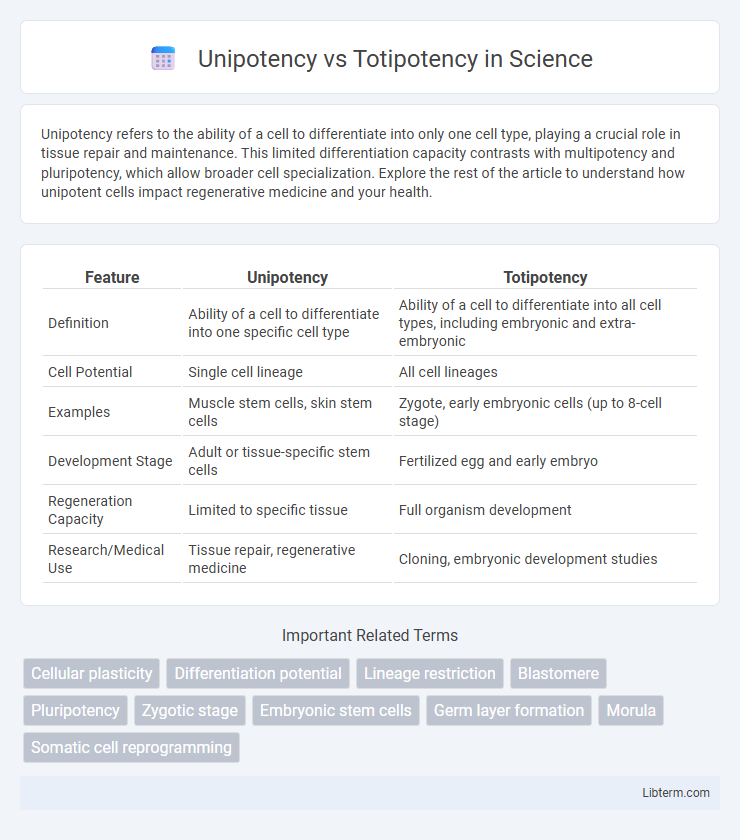Unipotency refers to the ability of a cell to differentiate into only one cell type, playing a crucial role in tissue repair and maintenance. This limited differentiation capacity contrasts with multipotency and pluripotency, which allow broader cell specialization. Explore the rest of the article to understand how unipotent cells impact regenerative medicine and your health.
Table of Comparison
| Feature | Unipotency | Totipotency |
|---|---|---|
| Definition | Ability of a cell to differentiate into one specific cell type | Ability of a cell to differentiate into all cell types, including embryonic and extra-embryonic |
| Cell Potential | Single cell lineage | All cell lineages |
| Examples | Muscle stem cells, skin stem cells | Zygote, early embryonic cells (up to 8-cell stage) |
| Development Stage | Adult or tissue-specific stem cells | Fertilized egg and early embryo |
| Regeneration Capacity | Limited to specific tissue | Full organism development |
| Research/Medical Use | Tissue repair, regenerative medicine | Cloning, embryonic development studies |
Introduction to Cell Potency
Unipotency refers to the ability of a cell to differentiate into only one specific cell type, essential in tissue-specific regeneration and repair. Totipotency represents the highest level of cell potency, where a single cell can give rise to all embryonic and extraembryonic tissues, enabling full organismal development. Understanding the spectrum of cell potency, from unipotent to totipotent, is critical in stem cell biology and regenerative medicine applications.
Defining Unipotency
Unipotency refers to the capacity of a stem cell to differentiate into only one specific cell type, highlighting its limited developmental potential compared to totipotent cells. These cells play a crucial role in tissue maintenance and repair by producing identical progeny tailored to a single lineage, such as muscle or skin cells. Understanding unipotent stem cells is vital for targeted regenerative therapies and precise cell replacement strategies.
Understanding Totipotency
Totipotency refers to the ability of a single cell to develop into an entire organism, including all embryonic and extraembryonic tissues, making it the most comprehensive form of cellular potency. This characteristic is primarily observed in the zygote and early cleavage stage cells, which possess the potential to generate every cell type necessary for full organism development. Understanding totipotency is crucial for advancements in regenerative medicine and developmental biology because it underlies the fundamental processes of cell differentiation and organismal formation.
Origins of Unipotent Cells
Unipotent cells originate from multipotent progenitor cells during embryonic development, gradually losing the ability to differentiate into multiple cell types and becoming specialized for a single lineage. These cells retain the capacity for self-renewal but are limited to producing only one specific cell type, distinguishing them from totipotent cells that can generate all embryonic and extra-embryonic tissues. The shift from totipotency to unipotency involves epigenetic modifications and signaling pathways that restrict gene expression, ensuring lineage commitment and functional specialization.
Sources of Totipotent Cells
Totipotent cells originate primarily from the zygote and the early blastomeres within the first few cell divisions following fertilization. These cells possess the ability to differentiate into all cell types necessary for the development of an entire organism, including both embryonic and extra-embryonic tissues. In contrast, unipotent cells arise from specialized progenitor cells and can only develop into a single cell lineage, limiting their differentiation potential.
Biological Roles and Functions
Totipotency enables a single cell, such as a zygote, to develop into all cell types, including embryonic and extra-embryonic tissues, vital for complete organismal development. Unipotency restricts a cell's fate to producing only one specific cell type, essential for tissue maintenance and repair, such as muscle stem cells generating muscle fibers. The distinction in biological roles highlights totipotent cells' foundational contribution to organismal formation and unipotent cells' specialized function in sustaining tissue homeostasis.
Molecular Mechanisms Behind Potency
Unipotency is characterized by a cell's ability to differentiate into a single cell type, governed primarily by highly specific transcription factors and epigenetic markers that maintain lineage commitment. Totipotency involves a broader molecular network, including pluripotency transcription factors such as Oct4, Sox2, and Nanog, alongside dynamic chromatin remodeling and DNA methylation patterns that enable differentiation into all cell types and extraembryonic tissues. The balance of signaling pathways like Wnt, MAPK, and TGF-beta intricately regulates these potency states by modulating gene expression and chromatin accessibility at key developmental loci.
Unipotency vs Totipotency in Development
Unipotency refers to the ability of a cell to differentiate into a single cell type, playing a crucial role in tissue-specific development and regeneration. Totipotency is the capacity of a cell to develop into an entire organism, including both embryonic and extraembryonic tissues, essential in early embryonic stages. The key difference in development lies in totipotent cells' potential to form all cell types, whereas unipotent cells are limited to one lineage, guiding specialized tissue formation and repair.
Applications in Regenerative Medicine
Unipotent cells, capable of differentiating into a single cell type, are valuable for targeted tissue repair due to their specificity and lower risk of tumorigenesis, making them ideal for applications such as skin regeneration and muscle repair. Totipotent cells, possessing the ability to form any cell type including extraembryonic tissues, offer broader regenerative potential but face ethical and safety challenges that limit their direct clinical use. Advances in manipulating totipotency pathways aim to harness their comprehensive differentiation capacity for complex organ regeneration and personalized regenerative therapies.
Future Perspectives and Research Directions
Unipotency, characterized by a cell's ability to differentiate into a single cell type, contrasts with totipotency, where cells possess the potential to form all cell types including extraembryonic tissues. Future research aims to unlock molecular mechanisms that could enhance unipotent cells' plasticity, potentially bridging the gap towards totipotency and expanding their therapeutic applications. Advancements in single-cell sequencing and epigenetic modulation are expected to drive innovations in regenerative medicine by enabling precise control over cell fate decisions.
Unipotency Infographic

 libterm.com
libterm.com